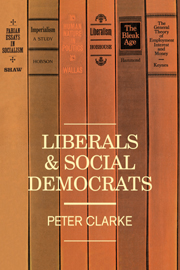Book contents
- Frontmatter
- Contents
- Preface
- System of references
- Prologue: Original sin and the modern state
- 1 The passion for improving mankind
- 2 Good men fallen among Fabians
- 3 Imperialism
- 4 The State and the Nation
- 5 Human nature in politics
- 6 War
- 7 Hobson's choice
- 8 The bleak age
- Epilogue: Sans everything
- Bibliographical notes
- Appendix
- Index
Epilogue: Sans everything
Published online by Cambridge University Press: 14 January 2010
- Frontmatter
- Contents
- Preface
- System of references
- Prologue: Original sin and the modern state
- 1 The passion for improving mankind
- 2 Good men fallen among Fabians
- 3 Imperialism
- 4 The State and the Nation
- 5 Human nature in politics
- 6 War
- 7 Hobson's choice
- 8 The bleak age
- Epilogue: Sans everything
- Bibliographical notes
- Appendix
- Index
Summary
Gilbert Murray emerged from the First World War an Asquithian Liberal, and such he remained; but, more important, his outlook was now governed by an overriding commitment to the League of Nations as the means of preventing war. He wrote later that he and Hammond ‘were in two senses “deviationists” from the true Morley–Hirst tradition’: meaning that while Hammond's active concern for welfare challenged Cobdenite Liberalism at home, his own constructive pursuit of peace challenged it abroad. In this, of course, he was asserting instead the Gladstonian standard. Hammond made this claim specific. If the Treaty of Versailles had inflicted injustices upon Germany, as all progressives believed, then the situation must be redressed. Appeasement, in this sense, was a policy of magnanimity to be carried out from a position of strength, and involved finding a means of redressing Germany's legitimate grievances. This did not involve siding with Germany against France. Hammond's favourite proposal in the early 1930s was to transfer one of the colonial mandates to Germany on the ground that this would remove an obvious cause of war. ‘The whole position seems so gloomy,’ he told Murray, ‘that I feel it is especially the moment for a Gladstonian gesture’ (26 August 1931). Murray, it must be said, remained unpersuaded that this was the right Gladstonian gesture.
The National Government, however, failed to match this sort of mood altogether, and its supposedly Liberal members seemed particularly culpable.
- Type
- Chapter
- Information
- Liberals and Social Democrats , pp. 276 - 290Publisher: Cambridge University PressPrint publication year: 1978



